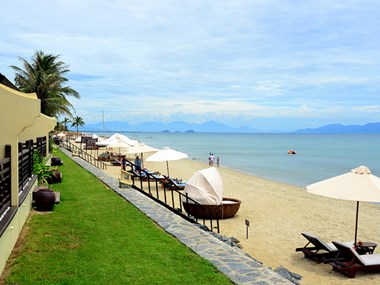
Vietnam has most affordable beaches in the world, according to TravelBird, a Netherland-based travel company.
TravelBird has released its 2018 Beach
Price Index, which breaks down the daily expenses of a seaside holiday at 327
of the most popular beaches in over 90 countries around the globe to reveal
which destination offer the best value for money.
It looked at the price of six popular beach purchases, including the cost of
sunscreen, a bottle of water, a beer, an ice cream, lunch, and facility fee, at
each destination. The facility fee covers any potential entrance fee to the
beach, in addition to the cost of renting a sun lounger, or a beach chair, and
an umbrella for one day.
These figures are based on statistics by local tourism agencies and data from
the World Tourism Organisation (UNWTO).
According to the rankings, Vietnam
came first for cheapest beach holidays, while the world’s most expensive ones
are found in the Pacific region and Italy.
Of all the beaches, the three cheapest spots are in Vietnam – Cua Dai Beach in
Hoi An Ancient Town, the central province of Quang Nam (13.44 EUR for all six
items); City Beach in Nha Trang city, the south central province of Khanh Hoa
(14.47 EUR); and Long Beach in Phu Quoc, the resort island of the Mekong Delta
province of Kien Giang (16.03 EUR).
Cua Dai Beach,
which is 7.6km long and about 5km from Hoi An's old quarter, is a popular
destination for tourists visiting the ancient city. It costs a holidaymaker
about 2.07 EUR for 200ml of SPF 30 sunscreen bottle from a local store; 0.37
EUR for a 500ml bottle of water, 1.6 EUR for a bottle of beer and 0.87 EUR for
an ice cream on the beach.
Meanwhile, lunch, including a drink and dessert for one person from a beach bar
or the closet establishments to the beach, typically cost an average of 7.43
EUR and facility fee is at 1.10 EUR in average.
The beach was also named the world’s cheapest by TravelBird in 2016 and 2017.
For the most expensive, beach-goers must pay a total of 78.57 EUR for all six
items in Anse Vata Beach in Noumea, New Caledonia, a special collectivity of
France in the southwest Pacific Ocean. It is followed by Finale Ligure, Liguria in Italy
(76.59 EUR) and Yonaha Maehama Beach,
Okinawa in Japan
(70.32 EUR).
Source: VNA
Located just a 20-minute drive from Hoa Binh City, Ora Hill Farmstay & Glamping Hoa Binh is a captivating new destination nestled in Mo hamlet, Bình Thanh commune, Cao Phong district. Combining farming with leisure, this tranquil retreat is perfect for those seeking balance, joy, and an immersive experience in the expansive beauty of nature.
Muong Bi - Tan Lac is renowned as one of the four famous Muong regions in Hoa Binh province. Blessed by nature with a favourable climate and stunning landscapes, Tan Lac holds great advantages for tourism development. The local tourism industry has made remarkable strides in recent times thanks to the attention and support from the local authorities and sectors.
With its strategic location, well-developed transport network, and diverse soil and climatic conditions, Hoa Binh is emerging as a must-visit destination in Vietnam's northwestern tourism corridor. The province boasts numerous attractions, including the Kim Boi hot springs (Kim Boi district), the Dau Rong cave complex (Cao Phong), the Mai Chau valley (Mai Chau), and the iconic Hoa Binh hydropower plant.
The northern mountainous province of Hoa Binh has been listed among the 71 most beautiful places to visit worldwide by the prestigious US travel magazine Condé Nast Traveller.
Hoa Binh province’s rich natural and cultural resources position it as a prime location for developing community-based tourism (CBT). In recent years, support from central and provincial policies, as well as assistance from non-governmental organisations, have encouraged local ethnic minority and mountainous communities to actively engage in the sector.



